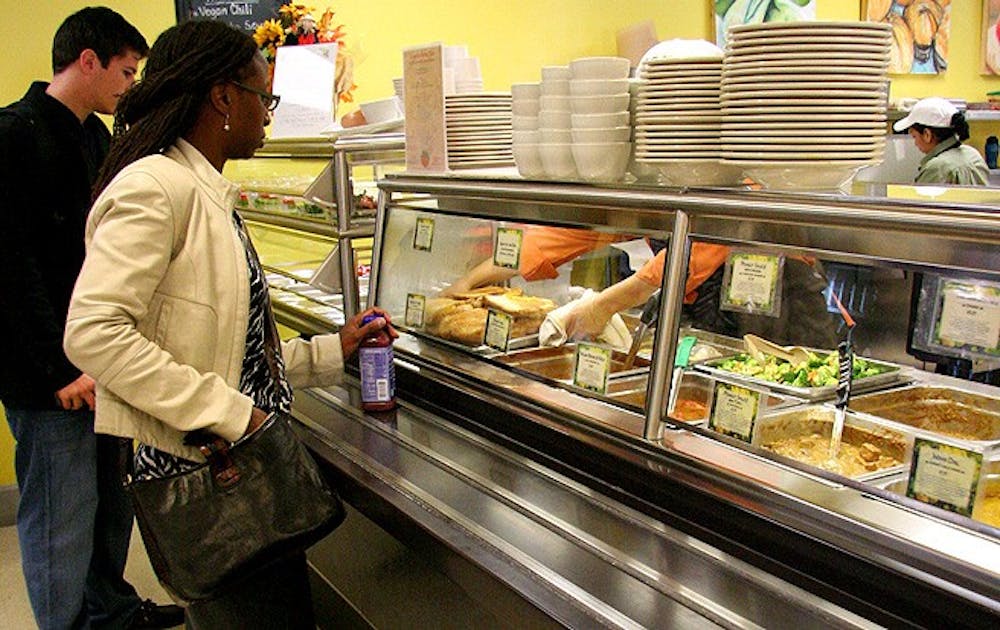Student outcry over the potential closure of the Refectory on West Campus may not be enough to keep the eatery open in its current configuration.
A meeting Friday between Refectory owner Laura Hall and Rick Johnson, assistant vice president of housing and dining, did not finalize the ongoing contract negotiations between the eatery and Duke Dining, Vice President for Student Affairs Larry Moneta wrote in an email Sunday. Further discussions will take place in the coming weeks and will include input from Dean of the Divinity School Richard Hays.
Duke is asking the Refectory to raise its commission from an average of 10 percent to 15 percent, but Hall has said this would require cutting services that she is not willing to cut.
Since The Chronicle reported April 24 that Duke Dining may not renew its contract with the Refectory in its original Divinity School location, which is currently operated by Hall’s Bon Vivant Catering company, students have voiced support for the sustainable, healthy food provider through a Facebook protest page and participation in a Duke Student Government survey.
DSG President Pete Schork, a senior, said students have overwhelmingly spoken against the possible closure of the Refectory.
“Despite all that, Student Affairs seems unmoved, and they maintain their position that they can recreate the Refectory without Bon Vivant Catering as the manager. And so that is what students are up against,” Schork said. “If [students] are passionate about this, they should continue to let the decision makers know how they feel.”
A Facebook group—“KEEP the Refectory”—gained 1,000 fans within 12 hours April 24. The group urged students to email President Richard Brodhead, Director of Duke Dining Robert Coffey and Johnson in support of the Refectory.
Additionally, more than 1,709 students responded to a DSG survey asking whether they would support a rate exemption for the Refectory to keep it on campus, even with the possibility that this would increase the undergraduate dining fee. Eighty percent said that they would. Following the results of the survey, DSG unanimously resolved that undergraduates would rather pay a higher fee than lose the Bon Vivant Catering operation in the Divinity School.
DSG and the Duke University Student Dining Advisory Committee have initiated discussions with University administrators about how the negotiations can be resolved. Student leaders cite the popularity of the eatery as the primary reason student input should be taken into account.
“The response has been, ‘We love the food, we love the space, it’s my favorite place to eat,’” Schork said.
DUSDAC co-chairs—senior Jane Moore and junior Beth Gordon—met with Johnson, Coffey and Assistant Director of Dining Barbara Stokes April 26 as part of a group of student leaders, and Schork had two additional meetings with dining administrators.
The social commitments of the Refectory should exempt it from the higher commission, Moore said.
“The actual cost that would be derived from the 50 percent increase is so miniscule in the grand scheme of things that it really feels like there’s something else at work here,” Moore said. “It’s upsetting to myself and other DUSDAC members because it can’t all be for an economic concern.”
Despite these efforts, the student outcry did not seem to change the tenor of negotiations at all, both Hall and Schork noted.
Moneta said, however, community preferences “will certainly help guide our plans.” Coffey and Johnson were unavailable for comment Sunday.
In a letter to the editor published in The Chronicle April 25, Moneta noted that the University is committed to a locally sourced, “green cafe,” with or without Hall as the operator.
The Refectory means more to students than its name, however, Moore said.
“[Administrators] want the concept of the Refectory, and they don’t want Laura Hall,” Moore said. “You can’t have one without the other. The Refectory and Laura Hall go together.”
She added that the Refectory employees would be loyal to Hall and not want to work in a Refectory replacement.
Neither Moore nor Schork are optimistic about the fate of the Refectory. They noted that both DUSDAC and DSG had been unaware of the state of the negotiations before last week.
“To not be informed about something like this, it’s upsetting,” Moore said. “It feels really calculated, and it’s really reminiscent of what happened with [former Director of Dining Services] Jim [Wulforst’s resignation] last summer, had this gone unnoticed.”
Schork noted that the loss of the eatery would have large implications on the student dining scene.
“It’s the one place on campus where you’ve really seen a successful food culture,” he said. “It’s a real dining culture that we should be trying to emulate across campus.”
Get The Chronicle straight to your inbox
Signup for our weekly newsletter. Cancel at any time.

